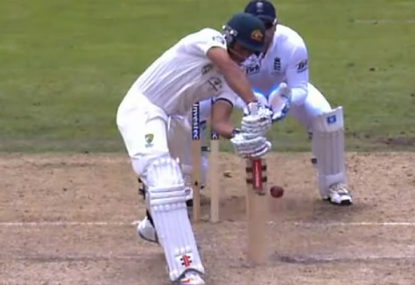Australia have gone win-less in their past nine Tests on away pitches designed for their downfall. So, should the Aussies return the favour by doctoring decks to their advantage in the return Ashes series?
Spin legend Shane Warne recently claimed Australia had never asked local curators for helpful pitches to his knowledge.
While Warne is not the most reliable pundit, there is no doubt Australia have not sought advantage from home pitches in the same obvious manner as subcontinent sides or the English team.
The Poms have admitted they ensured surfaces were overly slow and dry during the recent Ashes series, which they won 3-0.
Skipper Alastair Cook said in the wake of the fifth Test that this was the prerogative of the home side.
The assumption was that such surfaces would blunt Australia’s one strength, its pace attack, while also favouring champion English spinner Graeme Swann.
However, the Aussie quicks, particularly Ryan Harris, still troubled all of England’s top seven, bar Ian Bell.
Swann did prosper, taking 26 wickets at 29 as he exploited the turn, albeit slow at times, offered by the parched pitches.
But Skipper Michael Clarke said last week he had ruled out asking the curators at Aussie grounds to prepare green decks this summer to aid his quicks.
He said Australia’s recent success at home – eight wins and just two losses since the last Ashes – proved they did not need to alter the conditions.
Clarke, of course, would be unlikely to flag any planned doctoring of pitches so as not to give England time to prepare.
It is entirely possible that one or all of the surfaces at Brisbane, Adelaide, Melbourne, Sydney and Perth this summer may behave in a manner incongruous with their history.
But, if Australia does decide to have those decks tailored to their strengths, how would they want them to play?
Clearly, given the way they’ve struggled on the slow pitches in India and England, they would request the decks be made livelier rather than more sedate.
However, as Harris noted recently, producing over-juiced wickets could backfire because of the skill of England’s pace battery.
Australia’s batsmen have been exposed against the moving ball, most notably when dismissed for 47 against South Africa on a grassy Newlands pitch in 2011.
Should he recover from his hamstring injury in time to be fully fit for the first Test in Brisbane, Harris will surely delight in the extra pace and carry his home deck will provide.
The Queenslander hounded England’s top three in the recent Ashes, taking the wickets of Alastair Cook, Joe Root and Jonathan Trott 10 times for the combined average of 16.
He may not need extra assistance from the Australian surfaces to continue this domination.
Certainly the Aussies should not need to alter the state of their home pitches to negate the impact of Swann.
Australia is a notoriously difficult place for visiting Test spinners, particularly offies.
Superstar Sri Lankan tweaker Muttiah Muralitaharan, who took a record 800 Test wickets, snared only 12 wickets at the inflated average of 75 in Australia.
Indian off-spinner Harbhajan Singh has tormented the Aussies on the subcontinent with 86 wickets at 25 against them in Tests, yet been reduced to cannon fodder down under where he’s secured nine wickets at 73.
Swann was not nearly as potent on Australia pitches during the 2010-11 series, despite his side running amok en route to a 3-1 series victory.
Bowling with commendable economy but lacking penetration, the Englishman’s 15 wickets cost him 40 runs apiece.
Swann’s success in the recent Ashes series was built on his supremacy against Australia’s left handers.
Contrastingly, he laboured against Michael Clarke, Shane Watson and Steven Smith taking combined figures of 4-321.
That trio were far more vulnerable against the English quicks so it is not surprising Clarke would suggest he does not wish to offer James Anderson and Stuart Broad greater assistance than typical Aussie pitches would already provide.
Perhaps then Clarke is correct and Australia need not ask for spicier pitches this summer.
By hindering spinners and helping quicks but not excessively, the Australian decks are already perfectly suited to the current side when encountering England.





























































































